
It can be hard to keep birds off a strawberry crop. It can be hard to keep butterflies from laying eggs on cabbages and then there's the problem of blackbirds scratching around and uprooting newly planted lettuces. Of course, you can just throw netting over the top of plants, but birds will land on top and peck through to reach ripe fruits, and leaves pressed close to the net are vulnerable. The best solution is to protect at-risk crops with a rigid frame that’s covered with netting. It can be useful if frames are easy to move and easy to store and we don’t want to pay out a fortune for something we might only use for part of the year.
As you’ve probably guessed, my solution is to build your own frame. This simple structure is easy to make; it is easy to move from bed to bed as needed; and it packs into a small space in a shed when you don’t need it in the garden. You can put two frames together, or alter dimensions to make a larger frame by using longer canes – make sure to add in a few extra blocks and crossbars to provide stability. The blocks are all made to the same pattern so you can use them in any position. Once you have mastered how to make the blocks and assemble a frame, you can repeat the process to make frames to suit all your needs in the garden.
1 MARK OUT THE BLOCKS
Use the piece of card to mark out nine blocks along the length of the timber. Each block is 70mm x 70mm x 40mm. Put a pencil through the drilling points marked on the card to mark out the timber underneath. Each block should have a central point marked on a 70mm side and one drilling point marked on a 40mm side at 20mm from edges as shown on the card.
2 MARK A DRILL STOP
Denne historien er fra May 2020-utgaven av Kitchen Garden.
Start din 7-dagers gratis prøveperiode på Magzter GOLD for å få tilgang til tusenvis av utvalgte premiumhistorier og 9000+ magasiner og aviser.
Allerede abonnent ? Logg på
Denne historien er fra May 2020-utgaven av Kitchen Garden.
Start din 7-dagers gratis prøveperiode på Magzter GOLD for å få tilgang til tusenvis av utvalgte premiumhistorier og 9000+ magasiner og aviser.
Allerede abonnent? Logg på

SEPTEMBER SPECIALS
This month, with sweetcorn, figs and blackberries on the menu, Anna Cairns Pettigrew is not only serving up something sweet and something savoury, but all things scrumptious

FLAVOURSOME FRUIT AUTUMN RASPBERRIES
September - is it late summer or the start of autumn? David Patch ponders the question and says whatever the season, it's time to harvest autumn raspberries
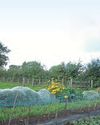
SOW GREEN THIS AUTUMN
Covering the soil with a green manure in winter offers many benefits and this is a good time to sow hardy types, says KG editor Steve Ott

A HISTORICAL HAVEN OF FRUIT AND FLOWERS
KG's Martin Fish takes time out from his own plot to visit a walled garden in Lincolnshire which has been home to the same family for more than 400 years
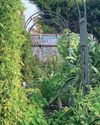
RESTORING THE BALANCE
The phrase regenerative gardening is often heard in gardening circles, but what is it? Can it help you to grow better veg? Ecologist Becky Searle thinks so, and tells us why
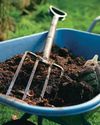
WASTE NOT, WANT NOT
Garden Organic's Anton Rosenfeld shares his expertise on using compost made from green bin collections with handy tips on getting the right consistency and quality
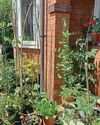
Celebrating Organic September!
In this special section we bring you four great features aimed at improving your crops and allowing nature to thrive
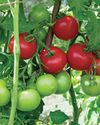
SEEING RED
Do your tomatoes have a habit of remaining stubbornly green? Or perhaps you're lucky to enjoy lots of lovely fruits - just all at once. Either way, Benedict Vanheems is here with some top tips to ripen and process the nation's favourite summer staple
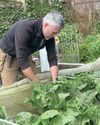
NEW KIDS ON THE BROCCOLI!
Rob Smith is talking broccoli this month with a review of the different types available and suggestions for some exciting new varieties to try

A NEW kitchen garden
Martin Fish is getting down to plenty of picking and planting on the garden veg plot, while Jill is rustling up something pepper-licking good!